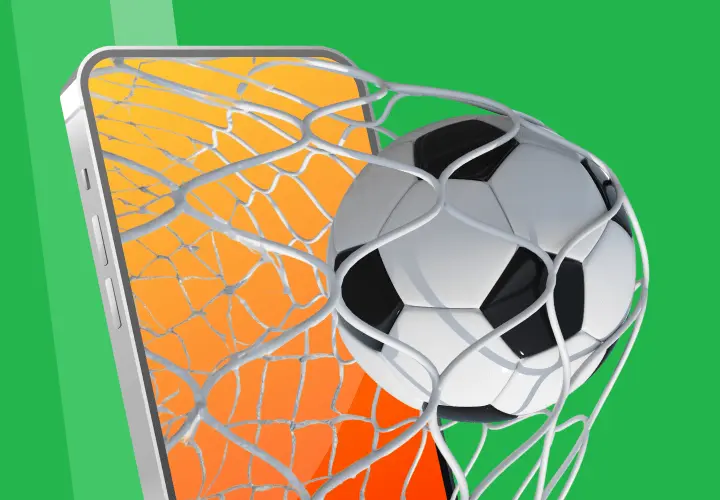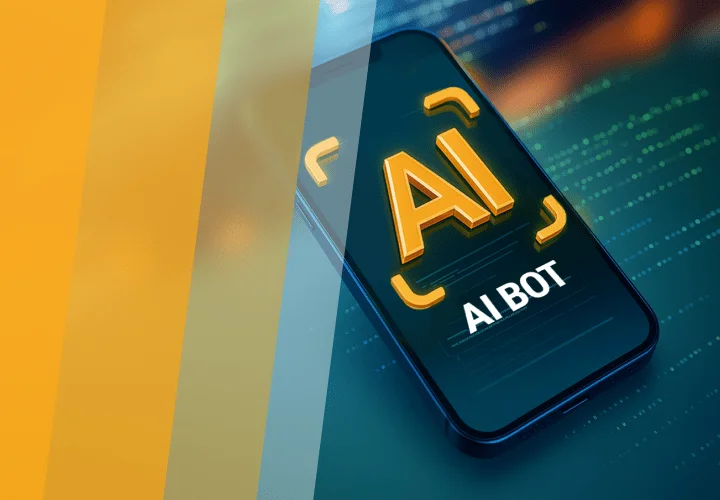The Future of Healthcare: Mobile Apps Trends in 2025
Table of contents
- Health App Market in Numbers
- Healthcare Mobile Apps Trends in 2025
- Internet of Medical Things (IoMT)
- Telemedicine
- Gamification
- Artificial Intelligence (AI)
- Voice Technology
- Blockchain
- Big Data & analytics
- Mental health apps
- Security and privacy
- Real-time tracking
- Cloud computing
- Benefits of Mobile Technology in the Healthcare Industry
- Advantages of healthcare mobile apps for doctors
- Advantages of healthcare mobile apps for patients
- Advantages of healthcare mobile apps for hospitals
- Wrapping Up
As the global healthcare industry embraces digital transformation, mobile health technology (mHealth) is taking center stage. This innovative field refers to using smartphones, tablets, and wearable devices to deliver health services and manage medical information. Mobile healthcare applications are becoming indispensable tools for professionals and patients, making healthcare more accessible. In the USA, 43% of the population used health apps in 2024:
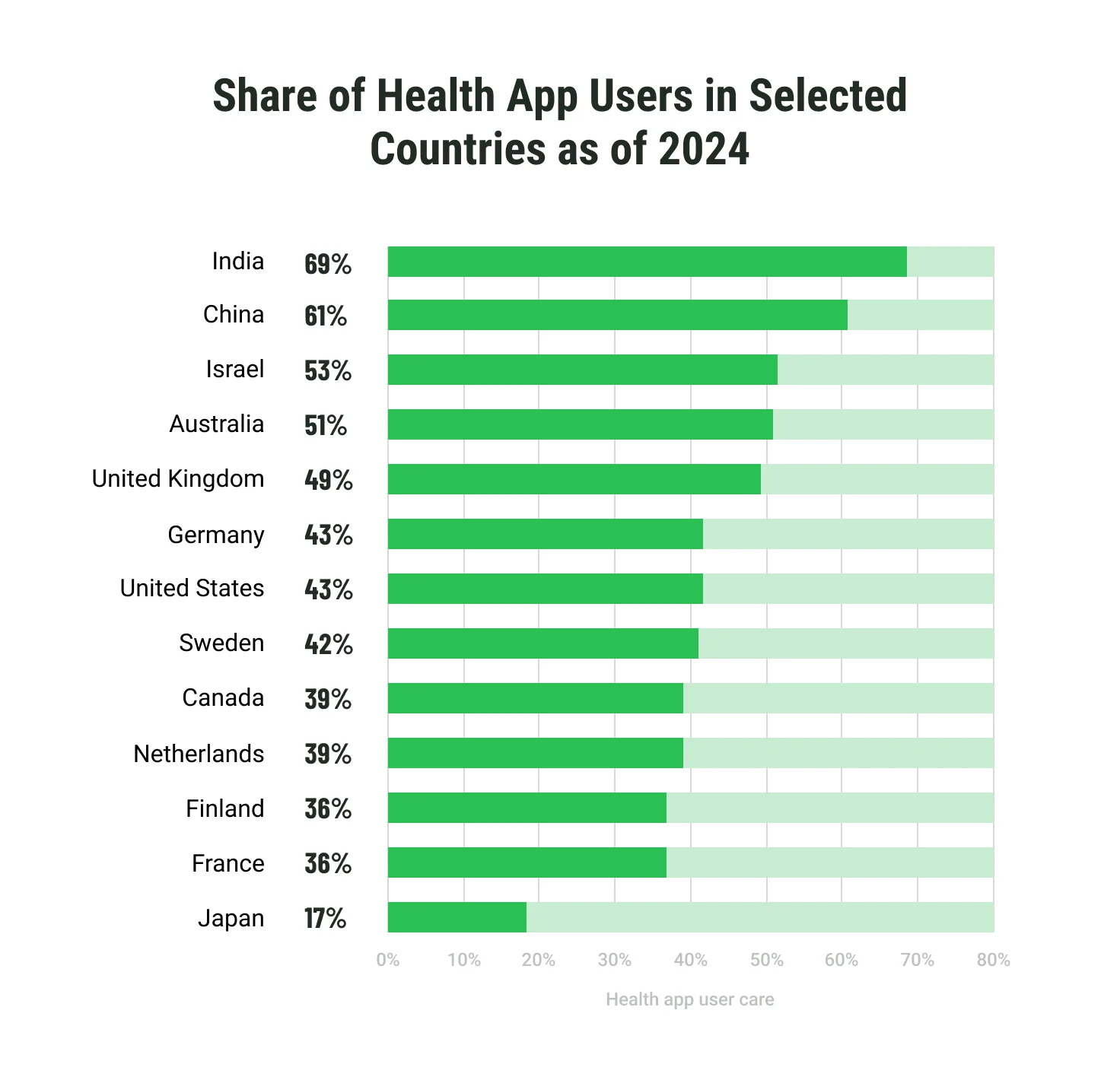
The global mHealth market is experiencing rapid growth, driven by technological advancements and the increasing demand for accessible healthcare solutions. The United States alone accounts for approximately 40% of this value. This dominance reflects the U.S.'s substantial investment in healthcare innovation and the widespread adoption of mobile health technologies. Globally, the expansion of mHealth is supported by the proliferation of smartphones, wearable devices, and remote patient monitoring systems, all of which are reshaping healthcare delivery.
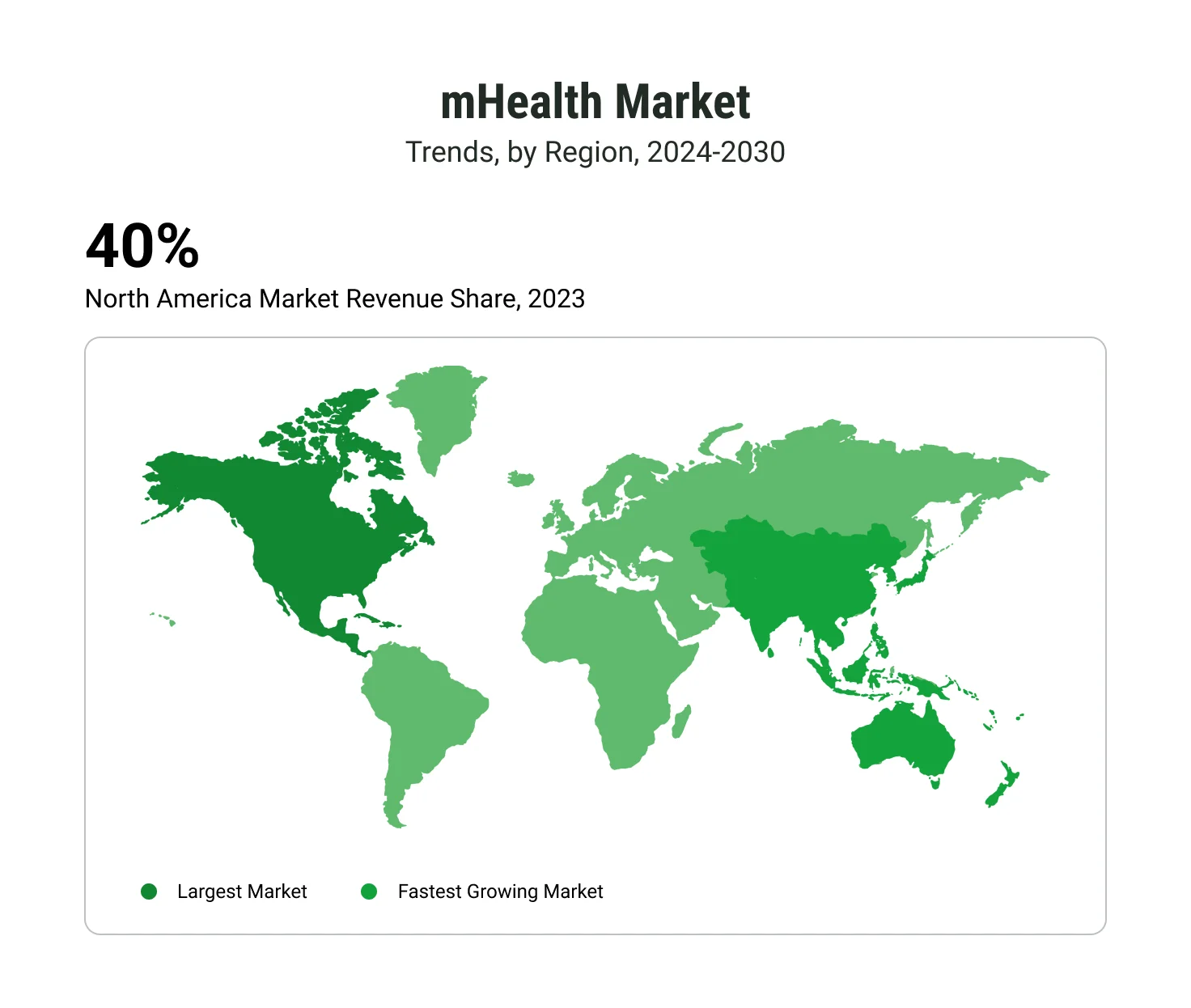
Let’s dive into the key types of healthcare apps driving this transformation:
- mHealth apps
These apps provide easy access to medical information, appointment scheduling, and patient health tracking. They empower users to monitor their health conditions and engage actively in their care.
- Electronic health records (EHRs)
EHR apps allow healthcare providers to securely store, manage, and access patient data in real-time. With EHR apps, streamlining workflows, enhancing collaborations, and reducing administrative errors have become much more manageable.
- Telehealth platforms
Telehealth solutions enable virtual consultations, bridging the gap between patients and providers. This technology is critical for expanding care access to remote areas.
- Remote patient monitoring (RPM)
RPM apps collect patient health data through connected devices, enabling continuous monitoring and timely interventions for chronic conditions.
- Wearable devices
Smart wearables like fitness trackers and smartwatches integrate with mobile apps to monitor vital signs such as heart rate, sleep patterns, and activity levels.
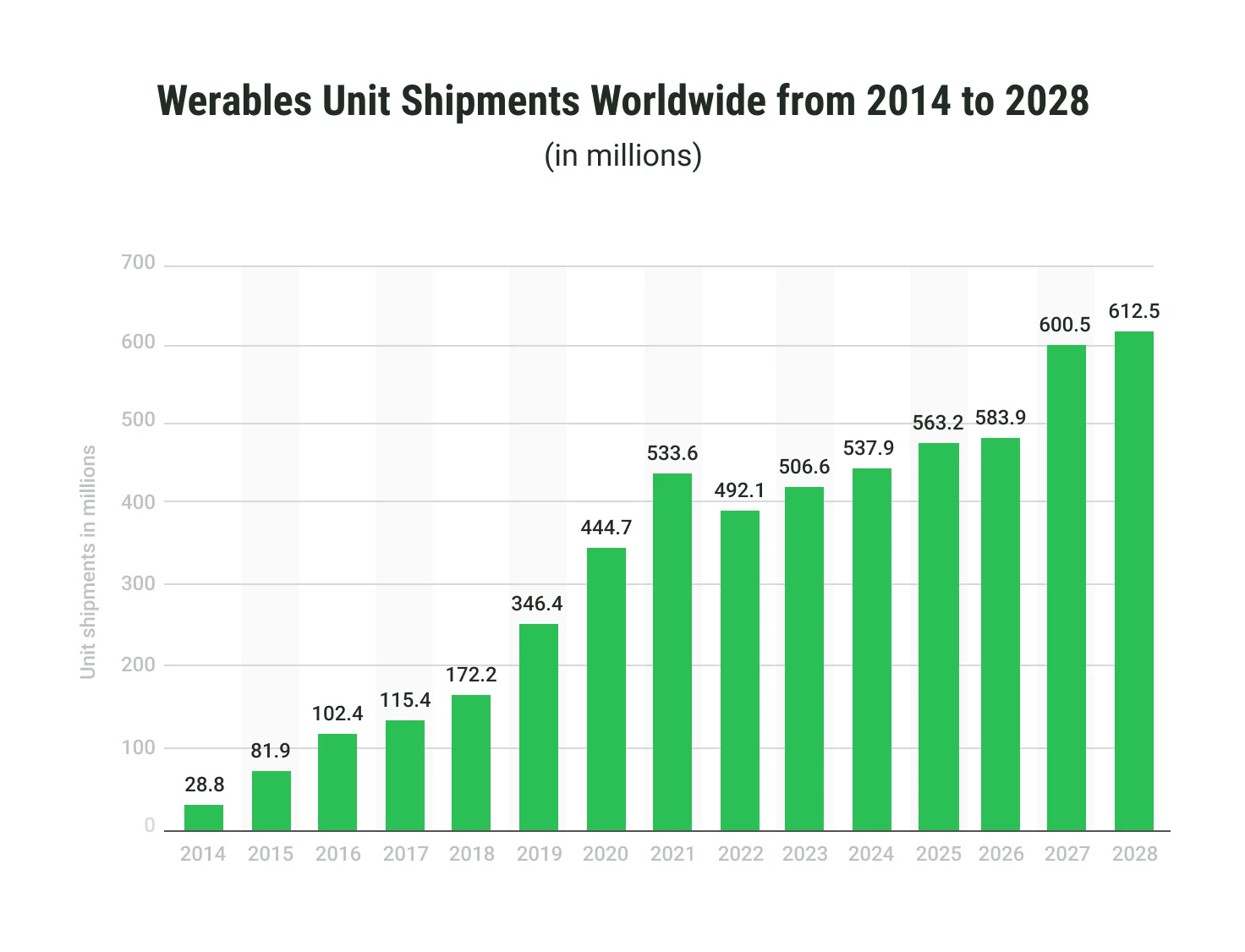
By the way, the global market for wearable devices has experienced phenomenal growth over the past decade. In 2014, only 28.8 million units were shipped worldwide, but by 2024, this number skyrocketed to an impressive 537 million units, marking a significant shift in the adoption of wearable health technologies. Various fitness trackers and smartwatches are now indispensable tools for continuous health monitoring, used to get real-time insights into users' health indicators and contribute to more efficient, data-driven healthcare management.
Health App Market in Numbers
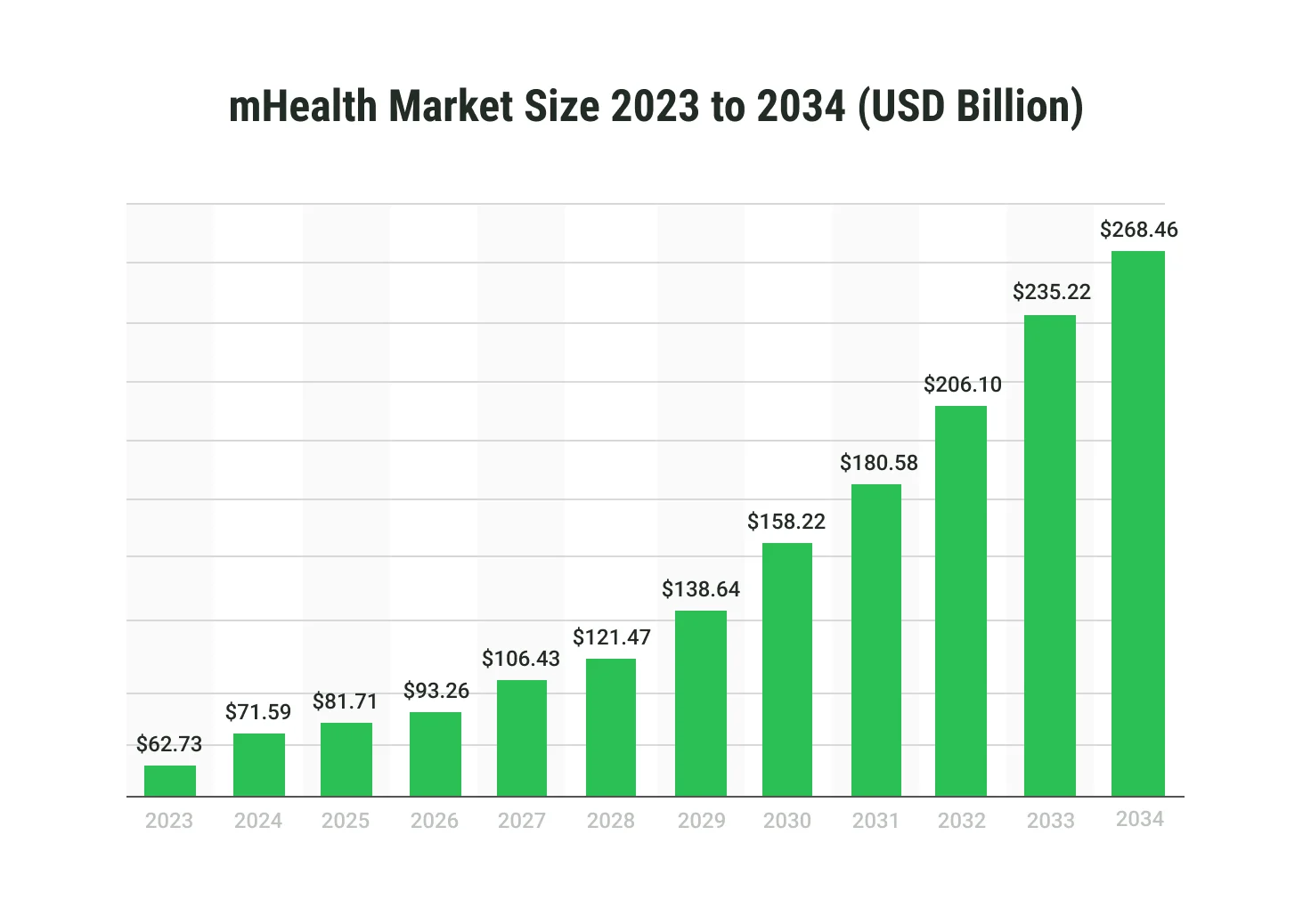
The mHealth market is charting an impressive growth trajectory, reflecting the surging demand for digital healthcare solutions. From $62.73 billion in 2023, the market is forecasted to reach $81.71 billion by 2025, marking nearly a 30% increase in just two years. By 2034, it is projected to hit a staggering $268.46 billion, showcasing the pivotal role of mobile health technologies in transforming global healthcare delivery.
The mHealth market expansion is fueled by the increasing prevalence of chronic diseases, a growing focus on patient-centric care, and technological advancements in wearable devices, remote monitoring, and telehealth. These trends set the stage for exploring the most promising innovations in mHealth, where AI, IoT, and interoperability continue to reshape how care is delivered and managed.
Healthcare Mobile Apps Trends in 2025
Today, healthcare apps incorporate advanced technologies to meet the evolving needs of patients, practitioners, and providers. These trends are improving the accessibility and quality of care and empowering individuals to take greater control of their health.
Below, we explore the key trends shaping the future of mobile healthcare apps:
Internet of Medical Things (IoMT)
IoMT refers to the network of connected medical devices and healthcare systems that collect and exchange data. IoMT enhances real-time monitoring and data sharing between patients and providers, from smart inhalers to connected insulin pens.
Benefits:
- Streamlines chronic disease management.
- Provides actionable insights through continuous data collection.
- Improves patient outcomes by enabling proactive care.
Impact: Doctors can make informed decisions quickly, patients experience more personalized care, and providers optimize resources by reducing hospital readmissions.
Telemedicine
Telemedicine allows remote consultations, diagnosis, and treatment through mobile apps. It is particularly crucial in underserved areas, bridging gaps in accessibility.
Benefits:
- Expands care to remote regions.
- Reduces travel time and costs for patients.
- Enhances efficiency for healthcare providers.
Impact: Doctors can reach more patients, and individuals gain access to timely, quality care.
Gamification
Incorporating game-like elements into healthcare apps motivates users to maintain healthy habits. Features like rewards, challenges, and progress tracking enhance engagement.
Benefits:
- Encourages adherence to treatment plans.
- It makes health monitoring enjoyable.
- Promotes long-term user engagement.
Impact: Patients remain motivated to follow care routines, reducing the burden on providers.
Artificial Intelligence (AI)
AI algorithms power predictive analytics, diagnostics, and personalized treatment plans. Machine learning models analyze vast datasets to uncover patterns and improve decision-making.
Benefits:
- Speeds up diagnostics.
- Enhances accuracy in treatment recommendations.
- Supports efficient resource allocation.
Impact: Doctors save time with AI-assisted insights, while patients benefit from faster, more precise care.
Voice Technology
Voice-enabled apps allow patients to interact with healthcare services hands-free, from booking appointments to managing medications.
Benefits:
- Increases accessibility for visually impaired users.
- Streamlines administrative tasks.
- Enhances patient engagement.
Impact: Healthcare becomes more inclusive, and providers reduce administrative workloads.
Blockchain
Blockchain ensures secure, tamper-proof storage and sharing of patient data. It fosters trust by enabling transparency and decentralization.
Benefits:
- Enhances data security.
- Reduces fraud in health records.
- Facilitates seamless interoperability.
Impact: Providers trust the integrity of shared data, and patients feel more secure about privacy.
Big Data & analytics
Big data empowers healthcare systems with insights from analyzing vast patient information, enabling evidence-based practices.
Benefits:
- Identifies trends for public health improvements.
- Optimizes resource allocation.
- Predicts disease outbreaks.
Impact: Providers gain actionable intelligence, and patients experience more effective care planning.
Mental health apps
Mental health-focused apps provide tools for stress management, therapy sessions, and emotional well-being tracking.
Benefits:
- Reduces stigma around seeking help.
- Offers 24/7 access to support.
- Encourages self-care.
Impact: Patients improve their mental health while healthcare providers reach a broader audience.
Security and privacy
With the growing volume of digital health data, robust security measures are essential. Apps integrate encryption, authentication, and compliance frameworks.
Benefits:
- Protects sensitive information.
- Ensures regulatory compliance.
- Builds patient trust.
Impact: Both providers and patients benefit from a secure, trustworthy healthcare ecosystem.
Real-time tracking
Apps with real-time tracking monitor patients’ health conditions continuously, enabling timely interventions.
Benefits:
- Prevents health emergencies.
- Supports personalized treatment plans.
- Enhances chronic condition management.
Impact: Providers can deliver proactive care, improving patient satisfaction and outcomes.
Cloud computing
Cloud technology facilitates the storage, access, and analysis of healthcare data across devices and locations.
Benefits:
- Enhances scalability and accessibility.
- Reduces IT infrastructure costs.
- Enables seamless collaboration.
Impact: Providers streamline operations while patients enjoy faster, more connected care.
Benefits of Mobile Technology in the Healthcare Industry
Mobile technology trends in healthcare are revolutionizing how care is delivered, enhancing efficiency and accessibility for all stakeholders. Here are the key advantages healthcare apps offer:
Advantages of healthcare mobile apps for doctors
- Streamlined patient management
- Improved diagnostics
- Efficiency boost
Healthcare apps empower doctors with advanced tools for diagnostics, patient management, and communication. Real-time access to patient data improves decision-making, while AI and analytics help identify patterns for accurate diagnoses. Apps streamline administrative tasks, allowing physicians to focus more on patient care.
Advantages of healthcare mobile apps for patients
- Convenient access
- Personalized care
- Empowerment
Patients benefit from personalized health management tools. Apps provide easy access to medical records, appointment scheduling, and health tracking. Features like telemedicine and mental health support ensure care is accessible anytime, anywhere, while gamification keeps users engaged in maintaining healthy habits.
Advantages of healthcare mobile apps for hospitals
- Optimized operations
- Enhanced security
- Cost savings
For healthcare providers, apps optimize operations and resource allocation. Cloud-based solutions enhance collaboration, while IoMT devices facilitate real-time patient monitoring. Blockchain-secured systems ensure data privacy, reducing risks of breaches and building patient trust.
Wrapping Up
Healthcare mobile apps are revolutionizing the industry, creating interconnected ecosystems that benefit patients, doctors, and providers alike. The trends shaping 2025, like IoMT, AI & ML, telemedicine, and enhanced security, are driving innovation, improving patient outcomes, and streamlining operations. These technologies ensure that healthcare becomes more efficient, personalized, and accessible than ever.
Choosing the right partner for healthcare app development is essential to harness these trends successfully. At Emerline, we deliver cutting-edge, scalable, and secure healthcare solutions to meet the needs of all stakeholders and skyrocket the healthcare industry's development.
Updated on Jan 24, 2025
